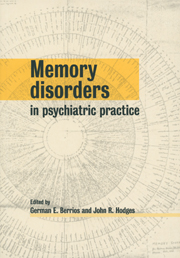Book contents
- Frontmatter
- Contents
- List of contributors
- Preface
- Part I
- Part II
- Part III
- 14 Paramnesias and delusions of memory
- 15 Déjà vu and jamais vu
- 16 Confabulations
- 17 Flashbulb and flashback memories
- 18 Functional memory complaints: hypochondria and disorganization
- 19 Dissociative amnesia: re-remembering traumatic memories
- 20 Recovered and false memories
- 21 The Ganser syndrome
- 22 Malingering and feigned memory disorders
- 23 Legal aspects of memory disorders
- Notes
- Index
23 - Legal aspects of memory disorders
from Part III
Published online by Cambridge University Press: 06 January 2010
- Frontmatter
- Contents
- List of contributors
- Preface
- Part I
- Part II
- Part III
- 14 Paramnesias and delusions of memory
- 15 Déjà vu and jamais vu
- 16 Confabulations
- 17 Flashbulb and flashback memories
- 18 Functional memory complaints: hypochondria and disorganization
- 19 Dissociative amnesia: re-remembering traumatic memories
- 20 Recovered and false memories
- 21 The Ganser syndrome
- 22 Malingering and feigned memory disorders
- 23 Legal aspects of memory disorders
- Notes
- Index
Summary
Introduction
Disorders of memory may be relevant to a wide variety of legal issues. In the context of criminal proceedings memory disorders may affect, for example, the reliability of witness evidence, fitness to stand trial and criminal responsibility. In the civil context memory disorders may affect an individual's mental capacity to make decisions in relation to medical treatment and other matters concerning their welfare, property and financial affairs. Such individuals may need forms of legal protection and safeguards. Memory disorders may also feature in claims for compensation. More generally, an understanding of normal and abnormal memory functioning may be important in assessing the accounts of victims of trauma. The chapter concludes with a brief note about the preparation of court reports.
Police custody and interviewing
Disorders of memory will obviously be important when individuals are being interviewed by the police for the purpose of obtaining evidence in the investigation of crime. Disorders of memory may affect the ability of a suspect to exercise his or her rights, fitness to be interviewed, and reliability of testimony.
In England and Wales the Police and Criminal Evidence Act 1984 sets out arrangements and safeguards for interviewing suspects in police custody, and police practice has to conform with the Codes of Practice issued under the Act. Zander (1995) provides an excellent guide to this legislation.
If a police officer suspects or is told that a person in police custody may be mentally disordered, handicapped, or incapable of understanding the significance of questions or his answers, an ‘appropriate adult’ should be called.
Keywords
- Type
- Chapter
- Information
- Memory Disorders in Psychiatric Practice , pp. 479 - 496Publisher: Cambridge University PressPrint publication year: 2000



